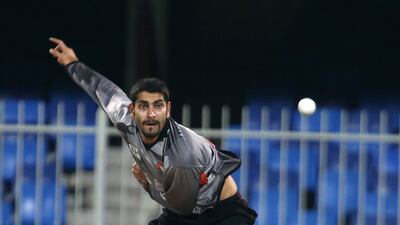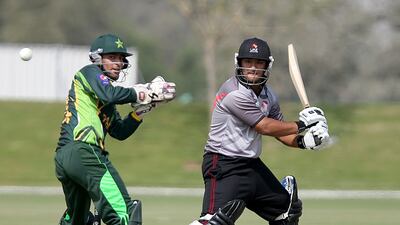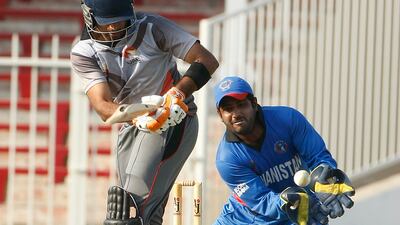Eight-and-a-half years feels like a lifetime in UAE cricket. But it is no longer than anywhere else.
When the national team make their second appearance at a T20 World Cup this month, their squad will have one survivor – Ahmed Raza – from that which debuted at the tournament in Bangladesh in 2014.
That is the same amount as West Indies have remaining from their 2014 vintage, and one more than Pakistan, whose squad is now entirely different.
And yet that competition in Sylhet seems like a different age altogether. The landscape of UAE cricket has changed entirely in the time since.
Their squad to take on the Netherlands, Sri Lanka and Namibia this month is almost exclusively professional, save for a few university students, and – in the form of Aayan Afzal Khan – a schoolboy.
Back in 2014, the squad included a cargo loadmaster, a flight catering worker, a receptionist, cabin crew, students, and banking staff.
They were not short on talent, but their lack of big-match experience counted against them. They lost all three of their matches against Netherlands, Ireland and Zimbabwe, and failed to progress beyond the first round. Despite that, the competition carries with it fond memories for the pioneering players from the UAE.
“It was a huge thing because after a very long time, a huge gap [18 years since the 1996 50-over version], we had managed to qualify for a World Cup,” said Vikrant Shetty, a former middle-order batter for the UAE.
“Playing at a World Cup is obviously the pinnacle of everything for us. With that comes a whole load of pressure, press interviews, cameras, so for us it was a huge, huge thing.
“It didn’t go completely in our favour, but the experience was amazing. For all us to be on that stage, in front of the TV cameras, we all were super excited.”
Coincidentally Shetty will be in Geelong for the T20 World Cup of 2022. He is in Australia representing the country in cricket, too, although not at the more visible event.

Shetty, who heads the content and social team for a media agency, is taking time off from work to play at the Indoor Cricket World Cup.
That finishes in Melbourne the day before the UAE’s opening T20 game. He hopes to stay on to support his erstwhile teammates in Geelong, and he knows what they will be going through.
“I remember in the press conferences, a lot of people were surprised we had full-time jobs and we were playing at the World Cup,” Shetty said. “They were asking questions about the fact we had taken leave, and managed to sideline our corporate lives in order to play for the UAE team in a World Cup.
“Bangladesh was an amazing experience, and one vivid memory is the security we had, police outriders taking us in and out of the ground.”

The Class of 2014 did include two players – Rohit Singh and Moaaz Qazi – who had recently represented the UAE in its maiden Under 19 World Cup campaign. Neither featured in the main event, as UAE kept faith instead with its tried and tested senior players.
The difference to now is stark. Vriitya Aravind, a 20-year-old student, is vice-captain of the side, and the likes of Karthik Meiyappan, 22, and Aayan Afzal Khan, 16, could also have key roles to play.
“Even in our team, I think we had great talent, but it comes down to the system and the structure,” said Rohit, who captained UAE at the 2014 U19 World Cup before graduating immediately to the senior squad.
“I am very happy for the youngsters who are coming into the team now. They are performing so well. It is what happens when you trust the youngsters and give them the freedom to express themselves. They are doing well.”
Rohit did not play in the competition proper in Sylhet, but did sample the big-match experience when he played in a warm-up game against the host country.
“The crowds were amazing because we got a lot of respect and support from them,” Rohit said. “Even when we played Bangladesh in a warm up match, they were really respectful and supporting if we fielded well, hit a good shot, or took a good catch.
“In UAE, we don’t get a lot of support. The stadiums are not filled, not like they are in Bangladesh. Even in the U19 World Cup, the stadiums were never full. There were always very few people in one stand, in a corner.
“In Bangladesh, it was always full and we got some support – even though we were playing against their team. I was nervous at first, but after a few overs you just settle down and try to take on board what is happening. As time moves on, you start absorbing it and concentrate on the important things.”

Rohit drifted from cricket after the World T20. He completed a master’s in data science, then got a job at Talabat, leaving little time for cricket.
Even the subsequent advent of central contracts was not enough to keep him in the game, but he is pleased to see how the game has moved on in the time since.
“One and a half years went by, I was enjoying my job, and I didn’t see a lot of things happening for me in cricket so I took a break,” Rohit, 28, said. “I would say I am still on a break. I just play a little indoor cricket here and there, but nothing in the professional way we used to do.
“Whatever happens happens for good. When I was there they had just started central contracts, but it was not as stable as it is now. The framework will keep getting better slowly.”

















